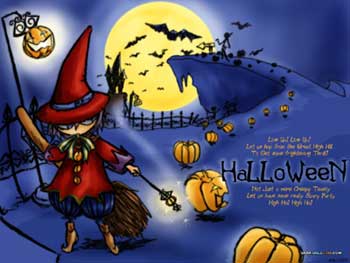影片对白 I earned this. I wiped tables for it, I steamed milk
for it, and it was totally-not worth
it.
思想火花 Make it on your own
考考你 一展身手
3. pass on
意思是“放过……不要,放弃”,通常用在拒绝对方的提议时。例如:I would pass on the trip. I got tons of things
to do at the weekend. 我周末有一大堆的事要做,旅游我就不去了。电影中的You know what, I-I'd better pass
on the game. 意思是“这么说吧,球赛我还是免了。”
4. the hell with
意思是“让……见鬼去吧。”例如:The hell with democracy, let's hire a king.
去他的民主,我们雇一个国王吧。电影中的 The hell with hockey, let's all do that!
意思是“让冰球见鬼去吧,我们都那样做(指罗斯回忆与前妻在一起的时光)!”
5. take one's mind off
意思是“转移某人的注意力。”例如:I can't take my mind off of you for the last summer
vacation. 整个暑假我满脑子想的都是你。电影中的Alright, alright, maybe it'll take my mind off it.
意思是“好吧,好吧,也许它会使我转移注意力。”
6. live on
意思是“靠……过活。”例如:Don't live on the past. You should look ahead.
你应该朝前看,不要老想着过去。电影中的 You can totally, totally live on this.
意思是“你完全,完全可以靠这个(工资)过活。”
文化面面观
Halloween 万圣节
在西方,万圣节(每年10月31日)被认为是死去的祖先的灵魂回家的日子。这些灵魂会寻找活人附身,所以所有人都打扮成鬼魂的模样而且喧闹地游行,以吓跑鬼魂。常见的习俗有
trick or treat和南瓜灯等。一到万圣节,孩子们就穿着古怪的衣服,挨家挨户去敲门,一边说“trick or
treat”。这时主人就会打开门,将一些糖果分发给孩子们。
 The word itself, "Halloween," actually has its origins in the
Catholic Church. It comes from a contracted corruption of All Hallows Eve.
November 1, "All Hollows Day" (or "All Saints Day"), is a Catholic day of
observance in honor of saints. But, in the 5th century BC, in Celtic Ireland,
summer officially ended on October 31. The holiday was called Samhain (sow-en),
the Celtic New year.
The word itself, "Halloween," actually has its origins in the
Catholic Church. It comes from a contracted corruption of All Hallows Eve.
November 1, "All Hollows Day" (or "All Saints Day"), is a Catholic day of
observance in honor of saints. But, in the 5th century BC, in Celtic Ireland,
summer officially ended on October 31. The holiday was called Samhain (sow-en),
the Celtic New year.
One story says that, on that day, the disembodied spirits of all those who
had died throughout the preceding year would come back in search of living
bodies to possess for the next year. It was believed to be their only hope for
the afterlife. Naturally, the still-living did not want to be possessed. So on
the night of October 31, villagers would extinguish the fires in their homes, to
make them cold and undesirable. They would then dress up in all manner of
ghoulish costumes and noisily paraded around the neighborhood, being as
destructive as possible in order to frighten away spirits looking for bodies to
possess.
The custom of trick-or-treating is thought to have originated not with the
Irish Celts, but with a ninth-century European custom called souling. On
November 2, All Souls Day, early Christians would walk from village to village
begging for "soul cakes", made out of square pieces of bread with currants. The
more soul cakes the beggars would receive, the more prayers they would promise
to say on behalf of the dead relatives of the donors. At the time, it was
believed that the dead remained in limbo for a time after death, and that
prayer, even by strangers, could expedite a soul's passage to heaven.
 The Jack-o-lantern custom probably comes from Irish folklore.
As the tale is told, a man named Jack, who was notorious as a drunkard and
trickster, tricked Satan into climbing a tree. Jack then carved an image of a
cross in the tree's trunk, trapping the devil up the tree. Jack made a deal with
the devil that, if he would never tempt him again, he would promise to let him
down the tree.
The Jack-o-lantern custom probably comes from Irish folklore.
As the tale is told, a man named Jack, who was notorious as a drunkard and
trickster, tricked Satan into climbing a tree. Jack then carved an image of a
cross in the tree's trunk, trapping the devil up the tree. Jack made a deal with
the devil that, if he would never tempt him again, he would promise to let him
down the tree.
According to the folk tale, after Jack died, he was denied entrance to Heaven
because of his evil ways, but he was also denied access to Hell because he had
tricked the devil. Instead, the devil gave him a single ember to light his way
through the frigid darkness. The ember was placed inside a hollowed-out turnip
to keep it glowing longer.
The Irish used turnips as their "Jack's lanterns" originally. But when the
immigrants came to America, they found that pumpkins were far more plentiful
than turnips. So the Jack-O-Lantern in America was a hollowed-out pumpkin, lit
with an ember.